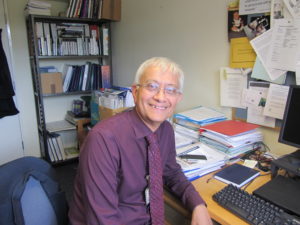Learn about palliative care worldwide
Learn about palliative care worldwide
by Maddison Gregor
Monday, December 03, 2018
It is rewarding to gain insights into how other countries' palliative care systems have evolved, what works and what doesn’t and why.”
Palliative care is a discipline that is understood and performed in a number of different ways across the world. Each country utilises their own knowledge, resources and skills to provide quality palliative care for people with a life-limiting illness.
In order for health professionals to learn about how palliative care operates in different countries, Jon Baines Tours offer dedicated palliative care tours led by experienced palliative care professionals.
David Oliviere is one of the selected palliative care tour leaders and is a consultant in psychosocial palliative care, a social worker, an educator and a clinical supervisor. For many years he was director of education and training at St Christopher's Hospice, London and gained an overview of palliative care settings around the world. David plays a key role in the tour and ensures all participants learn about palliative care and health care services in different settings so they can improve their own skills both professionally and personally.
“As an educator, it is rewarding to gain insights into how other countries' palliative care systems have evolved, what works, and what does not work, and why. The tours make the cultural lens real and fascinating. Countries with limited resources are good at thinking on their feet and often coming up with innovative solutions.
“Participants gain a real insight into medical care and culture. In the world of palliative care, in a multicultural society; this is increasingly useful and is beneficial to look at a problem in a different way.
“We often have a wide range of people join the palliative care tours including palliative care nurses and physicians, GPs, social workers and chaplains,” Mr Oliviere said.
With a special interest in culture and context, David values his knowledge of how palliative care operates in other countries and societies and enjoys sharing the knowledge with his tour participants.
“I wear many hats and have enjoyed different roles in hospice and palliative care and each time meet an amazing range of people on the tours. We compare notes but also just enjoy the leisure aspects of the visits. “
A significant difference in countries and cultures that David has found from his experiences is the varied palliative care and end-of-life care resources available.

“The lack of resources in many countries impacts people’s knowledge, perception and expectation of what palliative care really is. Religion and spirituality is also a notable difference between countries with diverse practices in communication, truth-telling and the role of the family in end-of-life care,” Mr Oliviere said.
From all of the tours led worldwide, David has said India is one of the most innovative sites where they have achieved some remarkable things.
“There are so many small and big examples of eye-opening practices. In India, I am struck by what is achieved within a context of material poverty, limited palliative care education and yet what our colleagues there have accomplished. Just two of many inspiring examples: learning of spirituality in the holy city of Varanasi and New Delhi's AIIMS (All India Institute of Medical Science) and CanSupport, the largest homecare service in India, if not in the world,” Mr Oliviere said.
David will be leading the next Palliative Care study tour to Japan in March 2019 as well as to India in March 2020. If you are interested in joining a tour or would like more information, visit the Jon Baines website.

